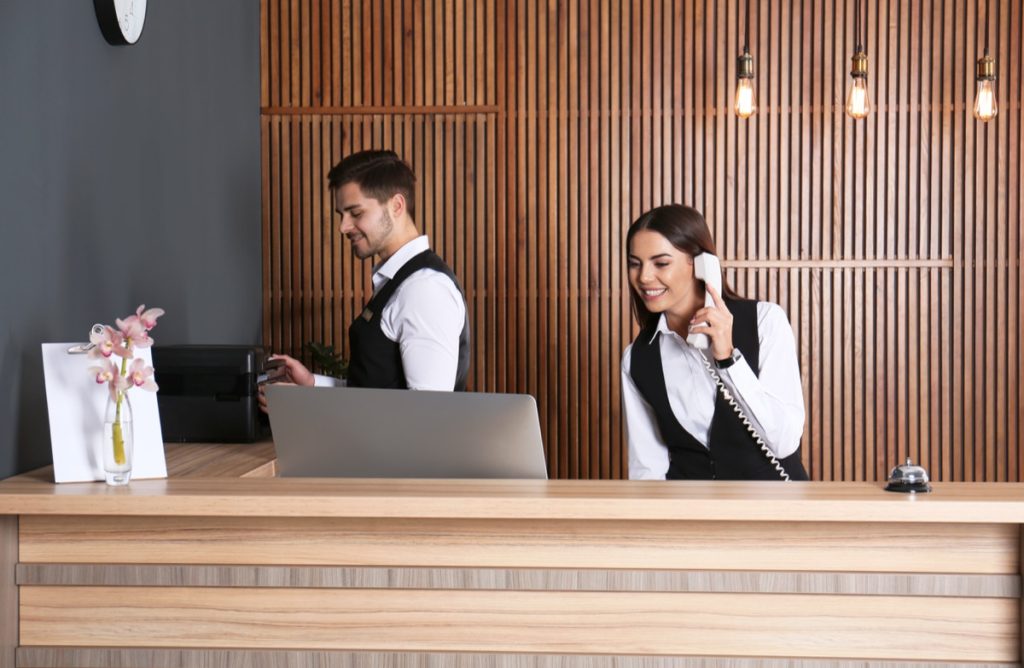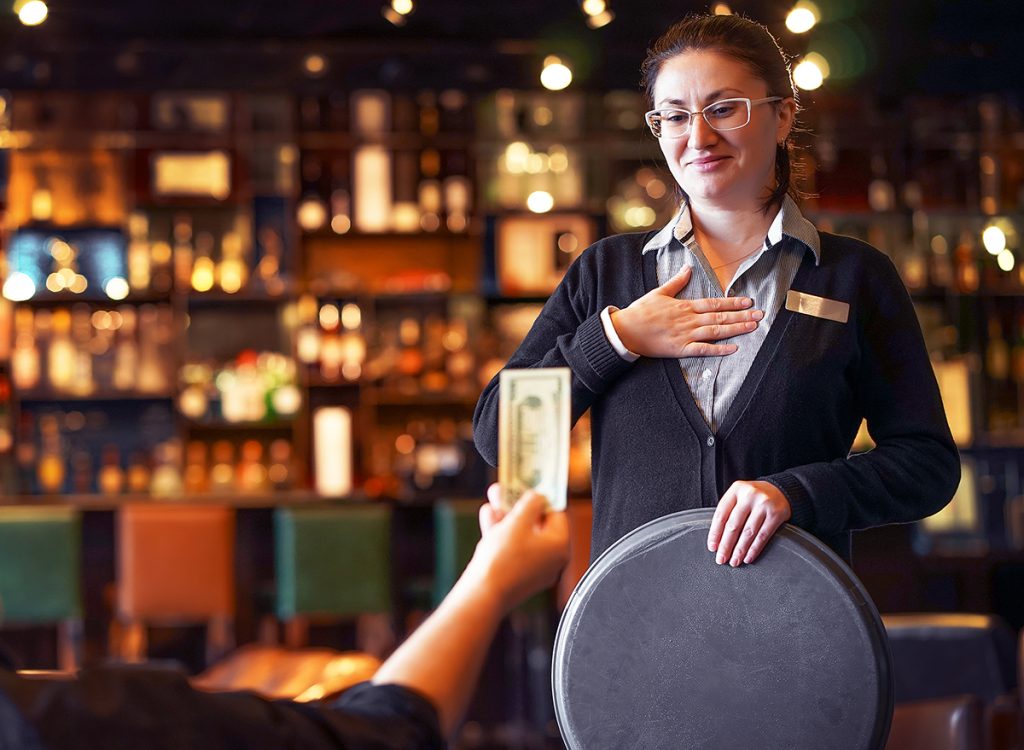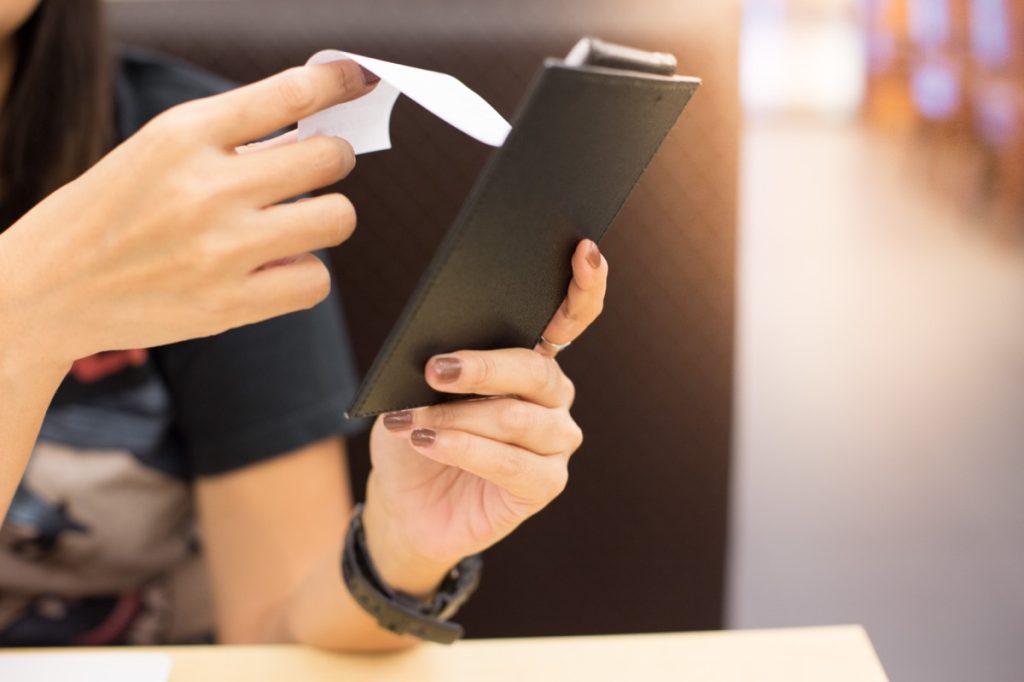5 Signs You’re Not Tipping Enough, Experts Say

Tipping isn’t just a part of life when spending money in the U.S.: It’s also how many people make their living. Unfortunately, while there are some social guidelines regarding how much gratuity should be left in each situation, the public can often interpret them differently or ignore them entirely. To clear up the confusion—and avoid underpaying hard workers everywhere—we’ve reached out to some top etiquette and hospitality experts to get their input on how you can avoid making any mistakes. Read on for the signs that you’re not tipping enough.
READ THIS NEXT: 6 Places You Should Never Tip, According to Etiquette Experts.
1
You’re forgetting your hotel’s concierge.

Hotels run on customer service from top to bottom. However, besides the servers bringing you meals and the cleaning staff charged with tidying your room, it can sometimes be easy to overlook the concierge who helps facilitate your experience.
“Many people assume that because they’re paying an overnight stay that this service is included, but it is not,” etiquette expert Lisa Mirza Grotts tells Best Life. “The concierge goes over and above the call of duty to make reservations and arrangements, so don’t forget them in your giving practice.”
Grotts cites the example of a concierge on a recent trip to London who was able to get her a reservation for tea for an important meeting.
“I left him a big tip at the front desk in an envelope and a thank you note,” she says. “Next time I need help, I know he’ll remember me, and it was the right thing to do.”
2
You’re getting reactions at restaurants.

No one likes to think of themselves as a lousy tipper. But if you’ve picked up on body language after paying the bill, experts say that your math might be off when it comes to adding a gratuity.
“When people give you strange looks after receiving your tip, it’s a sign that you may need to reconsider your tipping habits,” says Kristi Spencer, business etiquette expert and founder of The Polite Company. “In the United States, tipping 15 to 20 percent for good service [at a restaurant] is the customary norm. Anything less than that will likely give the impression you were unhappy with the service—or that you are downright rude.”
This can also come through in how your server is interacting with other patrons.
“If you notice that other guests receive preferential treatment or extra attention from [waitstaff], it may indicate that they are tipping more generously,” says Bob Vergidis, chief visionary officer for restaurant software company Point of Sale Cloud. “Not surprisingly, adjusting your tipping amount accordingly can help you get better service.”
READ THIS NEXT: New Law Wants to Introduce Tipping at Walmart and Other Major Retailers.
3
You’re stiffing some of your delivery drivers.

Technology has revolutionized the way we shop for everything from food to furniture. But if you’re having items delivered to your home, you could be unintentionally stiffing the team that brings it to you.
“I don’t mean for food or a meal, when of course you would tip. I mean having a television or a furniture delivery where they work extra hard,” says Grotts. “Cash is king here.”
4
You use excuses to decrease gratuity.

Restaurants are one of the main spaces where gratuity is expected at the end of a meal—so much so that many diners factor it into their budget when dining out. However, nickel and diming on what you leave your server is probably a red flag you’re not paying enough.
“If you spend your meal hunting for reasons to reduce the tip, not only does it make you look cheap, but it also indicates that you might not be the best lunch date,” says Spencer. “Every interaction you have, including how you handle tipping, says a lot about your character.”
For more life advice delivered straight to your inbox, sign up for our daily newsletter.
5
You’re forgetting that cash isn’t the only option.

Many in the service industry rely on cash tips to make ends meet. However, there are a few cases when it’s appropriate for gratuity to involve something other than money—especially during certain times of the year.
“If you’re tight on cash, a tip doesn’t necessarily have to be monetary,” says Vergidis. “The holiday season is all about the thought that counts. A small gift for your favorite waiter or your mail carrier can go a long way if you’re uncertain of how much to tip or just can’t work a cash gift into your budget.”